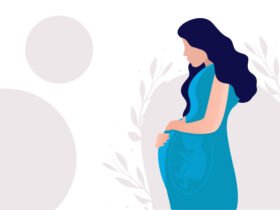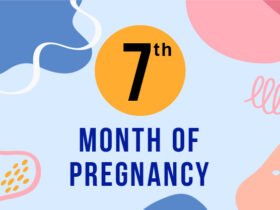After getting pregnant, it is natural to increase female weight. But it also has a standard. After being pregnant, the load of the woman generally increases by 30 to 40 percent, but if your burden is increasing more then, it is harmful to you and your baby.
The need for an additional diet is responsible for weight gain during pregnancy Because you can eat more dose of nutrition for yourself and your baby. But eating for two doesn’t mean that you want to drink as much as you want. The women who increase their mass during pregnancy, their children are born with more fat than their body needs.
How much should my weight gain in pregnancy?
Increasing weight during pregnancy is quite reasonable!, To give the best start to baby, your body grows, and there are many changes in it. Extra mass in the body comes from the following places:
- At birth, the average weight of the baby is between 2.8 to 3.3 kilograms.
- During pregnancy, the muscular layer of your uterus overgrows and its weight increases by an additional 0.9 kilograms.
- The placenta which infuses the baby is 0.5 kg in weight.
- The weight of your breasts increases by 0.4 kilograms.
- Blood volume increases, and body weight increases to 1.2 kilograms.
- There is extra fluid in your body, and there is an amniotic fluid all around the baby. They weigh about 2.6 kilograms.
- You will store some extra fat during pregnancy so that you can get extra energy during breastfeeding. It weighs around 2.5 kilograms.
Therefore, by the end of pregnancy, your weight can be 10.5 to 11 kg higher than the level before getting pregnant. It is the average weight gain during pregnancy, but undoubtedly, you are not an ordinary woman, nor any other woman is average.
Our pregnancy weight gain estimator can give you more personalized estimates of how much weight your pregnancy can increase.
How much weight should increase in your pregnancy, it will depend on how much your weight was before getting pregnant. Or how much your body mass index (BMI) was (see below).
Will my weight be taken in pregnancy?
Yes, your weight will measure in every appointment with the doctor. Doctors will note that your weight increases slowly. If you suddenly get too much weight, this may be a sign of pre-eclampsia. Your weight gain will also point to the fact that you are taking enough food.
However, your weight gain can also indicate signs about the development of the baby, but better estimates can make from how much your BMI measurement was before getting pregnant according to your weight gain. It advises that your doctor will calculate your BMI during your first pre-delivery appointment.
What if my weight is high and I am pregnant?
Before pregnant women who have a high BMI should try to control weight gain during pregnancy. Increasing weight gain increases the risk of developing low health problems:
- High blood pressure (high blood pressure)
- Gestational diabetes mellitus
- backache
- Pain in the legs and the varicose veins
- Excessive fatigue
- Birth of a big baby
Nonetheless, do not limit your diet. Research shows that the possibility of having high blood pressure or pre-eclampsia is not less when pregnant women overweight or who are weighing heavily in the first four or five months of pregnancy, taking low-calorie diets.
This type of diet will not be beneficial for your baby too. Instead, consult your doctor about the consumption of balanced and nutritious food.
It will ensure that you and your baby are happy and healthy even if you do not grow. It is better that you keep taking a regular, balanced diet, and do not eat colas, snacks, biscuits, cakes, desserts, and ice cream. These are not nutritious.
What if my weight is low and I am pregnant?
If your weight is lower than usual, then it is better that you increase your burden even before you get pregnant. Having less weight than usual can be difficult for you to conceive. If you are pregnant, then your baby may be born small. Small babies can have many health problems at times.
Talk to your physician if you are pregnant, and your weight is low. They will be able to advise on the best diet for you and your baby.
What if I am diabetic and I am pregnant?
If you have diabetes, then it is even more critical that you start your pregnancy with a healthy BMI. If you are reading this before getting pregnant, then you should consult with your doctor and talk about your diet. And If you are already pregnant, then you will need to take extra precautions to keep your blood glucose levels stable.
So, ask your doctor about a diet that helps you and your baby stay healthy. Most doctors may advise you to go to a dietician. Dieticians may call unique diet plans for pregnant women with diabetes.
Control your weight during pregnancy
You only need to eat food wisely. However, the latest research shows that a pregnant mother only needs 200 extra calories per day in her last quarter. But most doctors recommend taking 300 extra calories per day in the second and third quarters. Find out “how much extra calories you need in pregnancy” On Google.
A proper diet includes five parts of fruit and vegetables each day and food from all the main food groups:
- Protein: 10 percent of your calorie protein should be met, like meat, fish, egg, and pulses
- Dairy Products: About 35 percent of your calories should assemble from dairy products such as butter, milk, cheese, cheese and oils, and nuts (fat). If your weight is higher than usual, then they should be consumed in small amounts. Low fat spreads and yogurt can eat.
- Carbohydrates: Around 55 percent of your calorie (the most part) should mix with chapati, rice, bread, pasta, potato, and cereals (carbs). Products of whole grains are better than products made from flour; because they keep your blood glucose levels stable and you will not get much hungry.
Occasionally there is no harm in eating chocolate or ice cream, but keep in mind that the excess weight you gain during pregnancy increases, this growth is visible after the birth of a baby and it is easy for you to lose weight in the early months of motherhood. Will not done.














Leave a Reply